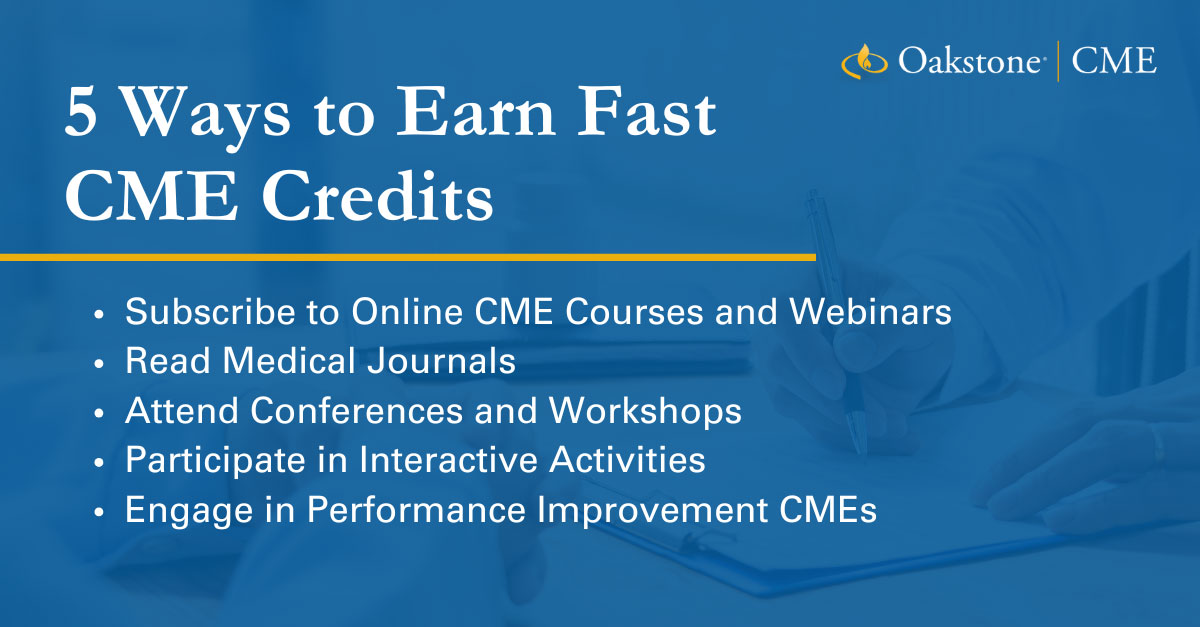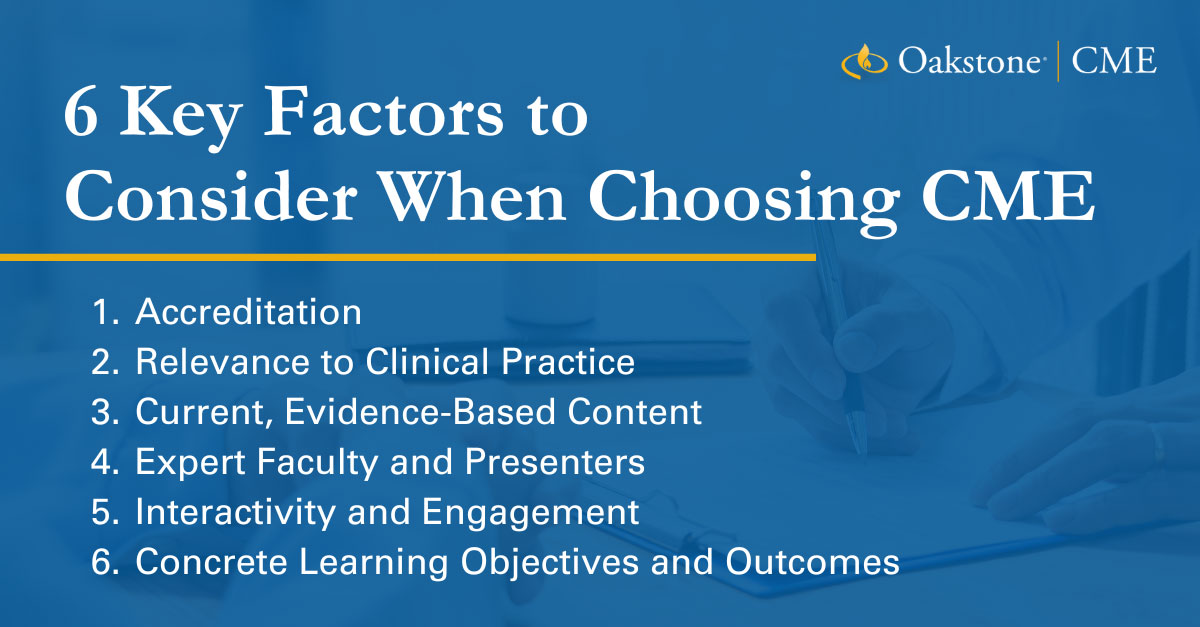How to Get CME Credits Fast: A Guide for Busy Physicians

As the year draws to a close, a familiar sense of urgency sets in for U.S. physicians. The deadline for continuing medical education (CME) credits looms, a reminder of your ongoing commitment to professional development and high-quality patient care. But finding the time to achieve your CME credits has become an increasing challenge. We know that physicians are busier than ever, and you need resources to get CME credits fast.
These continuing education credits, which are overseen by the Accreditation Council for Continuing Medical Education (ACCME) , aren’t just a formality. They’re a cornerstone of maintaining board certification, licensure, and hospital privileges. They ensure physicians remain at the forefront of medical advancements, refining their understanding of fundamental principles and acquiring new skills to benefit their patients.
Explore five quick ways to earn CME credits and the factors you should look for to evaluate whether a CME offering is a good fit for you and your career path.
5 Ways to Earn Fast CME Credits
Physicians can earn CME credits through a variety of methods to meet the requirements for maintaining board certification, licensure, and professional development. Here are some common ways you can earn CME credits.
Subscribe to Online CME Courses and Webinars
Many accredited organizations, such as Oakstone, offer online CME courses that can be completed at your convenience. Online learning sources provide CME credits for reading articles, watching webinars, or completing modules. Enduring materials, such as recorded lectures or podcasts, provide flexibility for earning credits on-demand. Additionally, live webinars and virtual conferences are also available from medical institutions and specialty organizations.
Read Medical Journals
Many medical journals offer CME credits for reading specific articles and completing post-article quizzes. Journals like JAMA, New England Journal of Medicine (NEJM), and others include this option. CME quizzes typically assess the physician’s understanding of the content.
This method allows physicians to stay updated on the latest research while earning credits at their own pace. However, the number of credits earned per article is typically lower than those earned at conferences or live activities.
Attend Conferences and Workshops
Physicians can earn credits by attending CME conferences, lectures and workshops hosted by medical specialty-focused associations, societies and teaching institutions (e.g., American College of Physicians,Cleveland Clinic or UCSF). Additionally, local or state medical societies often offer CME credits through other live events, such as seminars or workshops. These educational activities may also focus on state-specific healthcare issues or regulations.
CME conferences and workshops are effective ways to achieve credits because physicians can accrue several hours’ worth of credits in a brief time frame (typically 1-3 days).
Participate in Interactive Activities
Interactive, hands-on learning opportunities, such as grand rounds, simulation exercises, and case-based learning allow physicians to engage directly with experts, peers, and sometimes patients while earning valuable CME credits. These events, hosted by hospitals, medical schools, or professional organizations, often offer specialized programs tailored to specific subspecialties, like those from the American Heart Association (AHA), American Diabetes Association (ADA), or American Society of Clinical Oncology (ASCO).
Typically spanning one or more days, these immersive experiences enable physicians to gain in-depth knowledge and a significant number of credits in a short period, making them a practical choice for targeted professional development.
Engage in Performance Improvement CME
Performance Improvement continuing medical education (PI CME) credits help doctors become better at their jobs. Instead of taking classes or going to lectures, doctors look at their own work and find ways to make it better. They use proven methods and strategies to figure out what needs improvement and then adjust their practice accordingly. Instead of attending a course or lecture, PI CMEs can be earned on-the-job, allowing physicians to accrue credits without taking additional time.

6 Key Factors to Consider When Choosing CME
Evaluating the quality of your CME is crucial to ensure that you and your patients benefit from relevant, accurate, and effective education that genuinely enhances your practice. Here are several key factors to consider when assessing the quality of a CME program:
Accreditation
Look for AMA PRA Category 1 Credit ™, provided by an Accreditation Council for Continuing Medical Education (ACCME) provider or specialty-specific accrediting organizations like the American Academy of Family Physicians (AAFP). Accreditation ensures that the CME meets rigorous standards for content, learning outcomes, and educational integrity.
Relevance to Clinical Practice
Does the content highlight changes in protocols, guidelines, or treatment of care? High-quality CME should address real-world scenarios and offer practical, actionable insights that can improve patient care. The program should be relevant to your daily practice, ensuring it improves skills or knowledge in areas you regularly encounter.
Current, Evidence-Based Content
Ensure the CME is rooted in the latest scientific research. The information presented should be based on peer-reviewed studies, current guidelines, and consensus from authoritative medical bodies. High-quality CME avoids biases or conflicts of interest and provides objective, evidence-based education rather than promoting specific products or medications.
Ensure that the CME provider regularly updates their materials to incorporate new findings or changes in the medical field. It should stay on the cutting edge of innovation in your selected field, highlighting advances in your specialty.
Physicians should be wary of free CME programs, which are often produced by pharmaceutical or medical device vendors, and may include biased content. Physicians should carefully review the learning objectives, program content and presenter disclosures to make sure it aligns with their needs and will improve their knowledge and skills in a meaningful way.
Expert Faculty and Presenters
Who is delivering the content? A high-quality CME program features well-respected faculty or experts in the field, often with credentials in academia, research, or clinical leadership. Look for programs that provide bios or credentials of the speakers so you can assess their authority and expertise in the topic being presented.
Interactivity and Engagement
Does the program encourage active learning? High-quality CME often includes interactive elements such as case discussions, quizzes, simulations, or opportunities to ask questions. Engaged learning improves retention and application of knowledge. Programs that offer practical, hands-on learning or scenarios tend to be more effective in helping physicians integrate new knowledge into their clinical practice.
Concrete Learning Objectives and Outcomes
Are the learning objectives clearly stated? Quality CME programs will outline specific learning goals and objectives at the beginning of the course. These should be measurable and aligned with improving knowledge, competence, or performance. Post-activity evaluations or self-assessments help measure if the objectives were achieved and if the learning outcomes are meaningful.

Get Started on Your CME Online Today
Selecting the right CME format ensures that the time and resources invested are genuinely contributing to your professional development and, most importantly, improving patient care. By looking for accredited, relevant, evidence-based, and interactive programs, you can maximize the benefits of your CME activities, even if you’re in a rush to get your CME credits fast.
Ready to jump into online CME for on demand learning? Oakstone CME offers accredited, evidence-based, high-yield CME programming from recognized experts. Learn more about our CME offerings.
